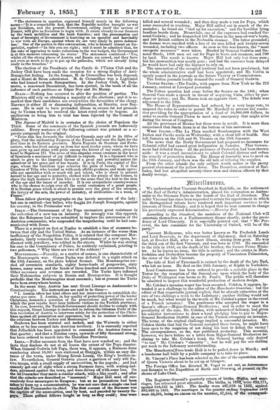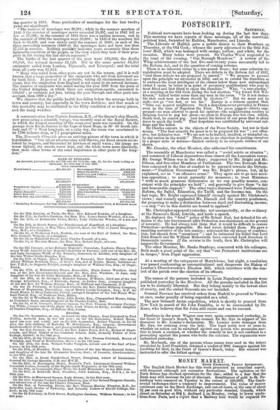tlautuito.
We understand that Viscount Stratford de Rodeliffe, on the retirement of the Earl of Derby's Administration, placed his resignation as Ambas- sador to the Ottoman Porte in the hands of the Earl of Aberdeen. The noble Viscount has since been requested to retain the appointment in which his distinguished talents have rendered such important services to the interests of Great Britain ; and it is hoped that he may consent to change his previously expressed determination.—Morning Post.
According to the Standard, the members of the National Club will entertain themselves at a Parliamentary dinner shortly, under the presi- dence of Lord Clancarty. It is especially pointed out, that " Mr. Per- ceval, the late candidate for the University of Oxford, will be of the PartY."
Viscount Melbourne, who was better known as Sir Frederick Lamb and Lord Beauvale, in the department of diplomacy, died on Saturday last, at Brocket Hall, after a short illness, arising from gout. He was the third son of the first Viscount, and was born in 1782. He succeeded to the title in 1848, on the death of his brother, the former Prime Minis- ter. As he leaves no issue, the title is extinct ; and the estates in Hert- fordshire and Derbyshire become the property of Viscountess Palmerston, the sister of the late Viscount.
The title of Earl of Tyrconnell is extinct by the death of the late Earl, who left no issue. He died on the 26th January, at Kiplin in Yorkshire.
Lord Combermere has been ordered to provide a suitable place in the Tower for the reception of the funeral-car upon which the body of the Duke of Wellington was• borne to St. Paul's. The public will therefore be admitted to inspect this wonderful production of modern design.
Mr. Cobden's invasion wager has been accepted. Cobden, it appears, in- tended it as a challenge to the editor of the Manchester Guardian : but the
editor of that respectable journal replied, that he already subscribes at the rate of two shillings a week to the Infirmary ; another shilling would not be-much, but what would be the worth of Mr. Cobden'a paper in the event
of a French invasion.? The gentleman who accepted the wager is a
Queen's officer—Major-General Brotherton ; and in order to meet the peculiarity of the case, Mr. Cobden, with unheard-of delicacy, had given his solicitor instructions to draw a bond pledging him to pay to Major- General Brothorton 10,0001. in case of the French attenipting an invasion. The terms of the original challenge implied a successful invasion. Mr. Cobden. thinks that had the General accepted those terms, he might have been open to the suspicion of not doing his best to- defeat the enemy ! The correspondence, so far, was published yesterday. This morning, however, we have before us a letter from Major-General Brotherton de- clining to take Mr. Cobden's bond, the General having only desired " to test" Mr. Cobden's " sincerity " ; but he will pay the one shilling per week to the Infirmary notwithstanding.
The ManchesteVree-trade Hall is to be pulled down in March; and a handsome hall built by a public company is to take its place.
St. Vincent's Place has been selected as the site of the equestrian statue of Queen Victoria about to be set up at Glasgow.
The Foreign Office has directed M. Vogel to set out, as Atatrenemer and Botanist to the Expedition of Barth and Overvteg, at present on: the shores of Lake Chad., The Registrar-General's quarterly return of births, elbktlis, and mar- riages, has attracted great attention. The births, in 18fit'w ere 824,171, against 616,251 in 1851. The deaths were 407,938 in 1852, against 395,933 in 1851. The marriages in the quarter ending September 1852 were 38,291, being an excess on the number, 37,255, of the correspond-
ing quarter in 1851. Some particulars of marriages for the last twelve years are significant. " The number of marriages was 38,291; while in the summer quarters of 1840-3 the number of marriages never exceeded 29,397, and in 1842 fell so low as 27,288 ; in the summer of 1844 there was a sudden increase, and in the summer of 1845 the marriages were 35,003 ; in 1847-8 the numbers fell back to 32,439, and rose slowly until the summer of 1849 ; in each of the three succeeding summers (1850-2) the marriages have not been less than 37,155 in number. Nothing probably indicates more accurately than these figures the condition of the people, or the view which they took of their pros- pects in life during the last eleven summers." The births of the last quarter of the year were 152,066, the deaths 99,946, the natural increase 52,120. But in the same quarter 55,315 emigrants sailed from London, Plymouth, and Liverpool ; and the total from all ports was 57,913.
" Many who sailed from other ports are not in the return, and it is well known that a large proportion of the emigrants who sail from Liverpool are by birth Irish. At present it isprobable, taking all circumstances into ac- count, count, that the emigration from England s not equal to its natural increase. The number of emigrants who sailed during the year 1852 from the ports of the "United Kingdom, at which there are emigration-agents, amounted to 350,647 ; or certainly not less, taking the year through and other ports into account, than 1000 a day."
We observe that the public health has fallen below the average both in town and country, but especially in the town districts; and that much of this mortality may be attributed to the filthy condition of so many places, and the damp weather.
A communication from Captain Denham, R.N., of the Queen's ship Herald, now prosecuting a scientific voyage, was recently read at the Royal Society, in which the deepest sounding of the ocean ever made was recorded. On the passage from Rio de Janeiro to the Cape of Good Hope, in 36° 49' South lati- tude and 37' 6' West longitude, on a calm day, the ocean was ascertained to be 7706 fathoms deep, or 7.7 geographical miles.
The Newcastle Chronicle gives an enticing picture of the town in which it is published. " Our alloys are swarming with thieves, our finest streets are in- fested by beggars, and barricaded by hawkers of small wares ; the lamps are worse lighted, the streets worse kept, and the whole town more disorderly, than most other towns of the same importance in other parts of the king- dom."



























 Previous page
Previous page